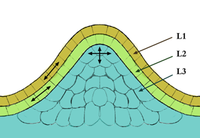
Distinct signaling routes mediate intercellular and intracellular rhizobial infection in Lotus japonicus.
Sign Up to like & getrecommendations! Published in 2020 at "Plant physiology"
DOI: 10.1093/plphys/kiaa049
Abstract: Rhizobial infection of legume roots during the development of nitrogen fixing root nodules can occur intracellularly, through plant-derived infection threads traversing cells, or intercellularly, via bacterial entry between epidermal plant cells. Although it is estimated… read more here.
Keywords: cytokinin; lotus japonicus; infection; distinct signaling ... See more keywords

Atypical Receptor Kinase RINRK1 Required for Rhizobial Infection But Not Nodule Development in Lotus japonicus1[OPEN]
Sign Up to like & getrecommendations! Published in 2019 at "Plant Physiology"
DOI: 10.1104/pp.19.00509
Abstract: Nod Factor induces an atypical receptor kinase, RINRK1, which specifically regulates infection thread formation in Lotus japonicus. During the legume-rhizobium symbiotic interaction, rhizobial invasion of legumes is primarily mediated by a plant-made tubular invagination called… read more here.
Keywords: atypical receptor; kinase; infection; rinrk1 ... See more keywords

NIPK, a protein pseudokinase that interacts with the C subunit of the transcription factor NF-Y, is involved in rhizobial infection and nodule organogenesis
Sign Up to like & getrecommendations! Published in 2022 at "Frontiers in Plant Science"
DOI: 10.3389/fpls.2022.992543
Abstract: Heterotrimeric Nuclear Factor Y (NF-Y) transcription factors are key regulators of the symbiotic program that controls rhizobial infection and nodule organogenesis. Using a yeast two-hybrid screening, we identified a putative protein kinase of Phaseolus vulgaris… read more here.
Keywords: nodule organogenesis; rhizobial infection; infection nodule;

Metallothionein1A Regulates Rhizobial Infection and Nodulation in Phaseolus vulgaris
Sign Up to like & getrecommendations! Published in 2022 at "International Journal of Molecular Sciences"
DOI: 10.3390/ijms23031491
Abstract: Metallothioneins (MTs) constitute a heterogeneous family of ubiquitous metal ion-binding proteins. In plants, MTs participate in the regulation of cell growth and proliferation, protection against heavy metal stress, oxidative stress responses, and responses to pathogen… read more here.
Keywords: rhizobial infection; metallothionein1a regulates; infection; phaseolus vulgaris ... See more keywords